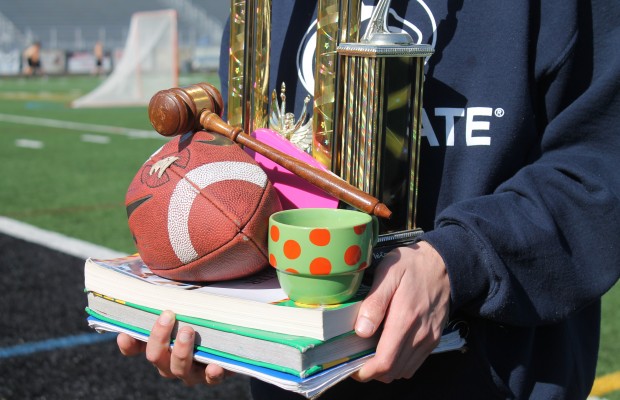Earning not Learning

“What’s your passion?”
This is the ultimate question of high school. Students face it when they contemplate which college to apply to or what career to pursue. It’s also passion that guides students to choose art history over physics, or tech theater over mock trial.
However, with increasingly selective admission rates at elite colleges and growing numbers of AP and IB classes, some students have become consumed with another type of passion – the college admissions process itself. Many aggressively tackle activities, including arts, sports, academics and other extracurriculars, not because they are curious and interested in learning more, but because they want to boost their resumes and set themselves apart from their peers.
“I think school has pretty much lost its meaning. I feel like people forget what college really is and have tunnel vision focusing on just getting (to a college), and they don’t think past that,” said Rena Dvoretzky, junior.
One reason why students are obsessed with getting into top colleges is because they equate elite colleges with promises of wealthy, successful lives.
“One way to look at school in a direct comparison is that grades equal money,” said Vaishnav Puri, junior. ”You do good in school, you do good in college; you do good in college, you get a good job; you get a good job, you get good pay.”
According to Thomas Jefferson, the original purpose of public education was to form an educated base of citizens that was prepared to make informed decisions about life and society, thus enabling a well-functioning democracy. But nowadays, the fight to get into elite schools has changed the focus of public education to the stratification of students based on standardized test scores and numerical grade calculations.
“Society has inclined us to go to school, and (tells us that) we’re idiots for getting bad grades in this class, so that’s how society classifies you,” said Allen Luo, sophomore. ”I guess (it) is important to remaining in the ‘smart’ category.”
As a result, many students are afflicted with depression or stress due to competition: in a Baltimore survey, 78% of teens reported feeling stressed from school work, as opposed to 68% from parental issues or 64% from friendship or relationship problems.
“I am seeing more and more kids with more and more highly filled up schedules that have very little time to be a kid because they feel like they have to, not because they truly enjoy learning the (subjects),” said counselor Richard Napora.
In reaction to this stress, students have taken all kinds of measures, from enjoying time off and hanging out with friends, skipping school, resorting to cheating, or even sometimes giving up altogether.
“Cheating, procrastination. It’s not like (students) care about what they’re learning, right?” Luo affirmed. “They just memorize it, then they forget it the next day.”
State governments (including California’s) have tried to alleviate these negativities by adopting Common Core State Standards, which emphasize critical thinking over fact recall. School administrators such as Napora also try to “alleviate stress rather than increase it” by guiding students through tough decisions and making campus a friendly environment.
“I try to talk to my kids individually about their aspirations, their level of stress and their innate ability, and I try to guide them according to them and not what everyone else is doing,” Napora said. “I try to go backwards and ask kids where (they see themselves) in five to ten years and figure out all the different ways to get there.”
Students themselves have sought personally meaningful learning experiences in extracurricular activities.
“I find that I’ve learned a lot of life skills through more extracurriculars than classes themselves, theater tech especially,” said Dvoretzky. “Tech taught me how to deal with people, how to deal with difficult situations.”
Puri also thinks that competition itself is not necessarily a bad thing. “I think a competitive environment often fosters the urge to achieve more in the best. That’s why we have people who are valedictorians and people who do full IB,” he said. “It’s still generating people who have a larger scope of thinking and can analyze things more deeply, so I think competition does actually bring the best out of us.”
Ultimately, happiness is not defined by a diploma, degree, or GPA; rather, true happiness comes from following passions and finding meaning in what one does. “I tell kids that you don’t have to get a 4.7 and be in an Ivy League school to have an enjoyable life,” Napora said.
Common Core: Problem or Solution
In 2010, California adopted the Common Core State Standards (CCSS) in an effort to replace ineffective educational standards that facilitated fact recall rather than critical thinking. To combat America’s mid-to-low rankings in international math, reading and science skills, Common Core tries to encourage deeper analytical thinking through these new standards. It is hoped that Common Core will better prepare K-12 students for “entry-level careers, introductory academic college courses, and workforce training programs.”
“The biggest change is that the idea of literacy and writing is really pervasive across the curriculum,” said principal Joshua Eby, “so you’ll see more writing, basic reading skills, and literacy skills in all classes.”
CVUSD hopes to fully implement Common Core by next year, which will result in several notable changes to both curriculum and testing. STAR tests will be replaced with computerized “smart” tests that can customize individualized questions based on a student’s responses. Students should expect more discussions, writing-based activities, and multimedia teaching methods in all subjects. Certain key concepts, especially in mathematics, will also be grouped into different course levels.
Proponents of Common Core argue that it modernizes instructional methods and challenges students to higher levels of critical thinking. “It’s more about how kids produce what they know,” Eby added. “There’s also a lot of technology that’s rolled into it, so it’s forcing students and teachers to use technology to demonstrate their knowledge.”
However, Common Core has also been criticized for requiring overly abstract thinking styles, especially for elementary-age children, and because its entirely computerized testing may be too complex for students who don’t ordinarily use such technology at home. Even parents have allegedly been unable to solve the oddly-worded, outside-the-box test questions.
Despite these arguments, supporters still assert that Common Core has done more good than harm by unifying and challenging students in schools.
Taking (not making) the Grade
As students face increasing stress and pressuring competition, academic dishonesty has in turn become an increasingly serious problem for teachers and administration.
In the 2013-2014 school year, three students were drop-failed as a result of a second academic honesty offense in two years. So far this year, that number has doubled to six, while 36 have committed first time offenses. Many argue that this uptick stems from the hostile environment found among classmates who feel forced to compete for higher letter grades and test scores, rather than working to actually learn the material.
“Cheating (only exists) because of the competitive environment,” said Jackson Mazziotta*, sophomore. “If it wasn’t for the competitive environment, I don’t think anyone would cheat because you (wouldn’t need) … to do better than your peers and see what your peers are doing.”
“Have we created so much pressure on these kids to get A’s or at least B’s, that a B is not good enough and they have to cheat to get an A?” questioned Nathan Valencia*, math teacher. “I’ve (also) had parents hound their kids for getting a B in a CP course to the point where ten years ago, I had a girl try to commit suicide because she was getting a B in a CP class. That’s parental pressure. Do teachers create pressure? Probably some do. I try not to.”
Mazziotta and Adam Jacobson*, sophomore, were both caught with answer keys to a science lab. They and two other students in the class were put on academic dishonesty contracts and given a first-time warning, while a fifth student was drop-failed from class because he committed his second offense on contract.
“School’s hard. There’s a lot to juggle and sometimes you need the extra help and you don’t always have people around you,” reasoned Mazziotta.
“You’ve been taught to be the best by your teachers, not just by students,” agreed Jacobson. “I would say technically you’re forced to choose that option because it’s all or nothing. In the end, it’s who can use the best of their resources. Right now this is an extremely smart school; especially for my grade, it’s tough.”
Although Mazziotta claimed that “he will never cheat again”, Jacobson believes that “there are some things you just can’t change”, including the hypocritical cheating stigma.
“It’s very ironic that other people criticize other people for (cheating),” Jacobson said. “But the reality is that that person cheated too.”
From a teacher’s perspective, students cheat because they believe that what they score on a test matters more than actually taking the time and effort to know, learn, and apply the learned material in their daily lives.
Scott Ellis, history teacher, believes that although students are “more focused on worrying about four years down the road rather than being in the moment,” cheating can affect a student’s future in ways they can’t anticipate. “I think it’s a choice that people make that leads to other wrong choices, and I don’t mean just academics, but also to that mindset where you feel like it’s not a big deal,” he said. “It can lead to greater issues down the road. It seems kind of trivial and small, but it’s actually not.”
“It becomes a character issue,” agreed Valencia. “You start cutting corners in your job. A lot of people point fingers at you. It can follow you. If you cheat in little things, you’ll cheat in big things.”
On suspicion, a teacher may report a cheating incident to administration, who then conducts an investigation of assignments, facts, and interviews. If students are found guilty of academic dishonesty, they must sign a two-year contract agreeing to that if they cheat again, they will be immediately drop-failed from their current class, resulting in an F in the subject.
“I personally think that the school environment is the worst place in terms of cheating. The reality is that no one actually listens to students,” said Jacobson. “They say that life isn’t fair, but school is an opportunity for all kids, and maybe they made a mistake or were caught in an unfair situation such as my own, but there’s absolutely no hearing at all.”
Despite the zero-tolerance policy and threat of academic dishonesties, both teachers and students seem to remain pessimistic on the fact that “it’s going to happen no matter what.”
“I think sometimes students are in classes that are higher than what they should be in, which can lead to problems,” said Ellis. “Whether or not it’s a hard class, you’re going to have students who take shortcuts regardless. It’s discouraging, to be honest, to say that as a teacher.”
*name changed upon request



